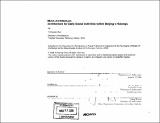Micro architecture : architecture for daily social activities within Beijing's hutongs
Author(s)
Chao, Yi-Hsiang
DownloadFull printable version (36.52Mb)
Alternative title
Architecture for daily social activities within Beijing's hutongs
Other Contributors
Massachusetts Institute of Technology. Dept. of Architecture.
Advisor
Yung Ho Chang.
Terms of use
Metadata
Show full item recordAbstract
This thesis is an attempt to propose the alternative architectural strategy which derives from the Micro Urbanism in the micro-scale realm in the Asian main cities. Based on the Micro Urbanism, the project is to propose a system of micro architecture that provides ubiquitous ideal public spaces for local inhabitants' daily social activities within Beijing's 25 hutong-preserved districts. Hutongs were the historical tiny alleys distributed infinitely within Beijing and the typical public spaces for the local inhabitants. Because of the rapid urbanizations, hutongs no more can play the role so the micro architectures are expected as repetitive architectural units of Urban Restroom that provide the essential needs of Beijing's everyday life. The thesis is to argue that Beijing's contemporary rapid monolith architectures from a macro scale often ignore the city's micro internal orders. Learning from the internal systems of the city, the statement is Minimum Urbanism that suggests the minimum architectural operations that work with the city collaboratively in a sustainable level from micro scale to macro scale.
Description
Thesis (M. Arch.)--Massachusetts Institute of Technology, Dept. of Architecture, 2008. Includes bibliographical references (p. 87-89).
Date issued
2008Department
Massachusetts Institute of Technology. Department of ArchitecturePublisher
Massachusetts Institute of Technology
Keywords
Architecture.